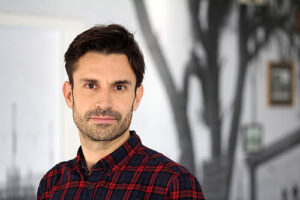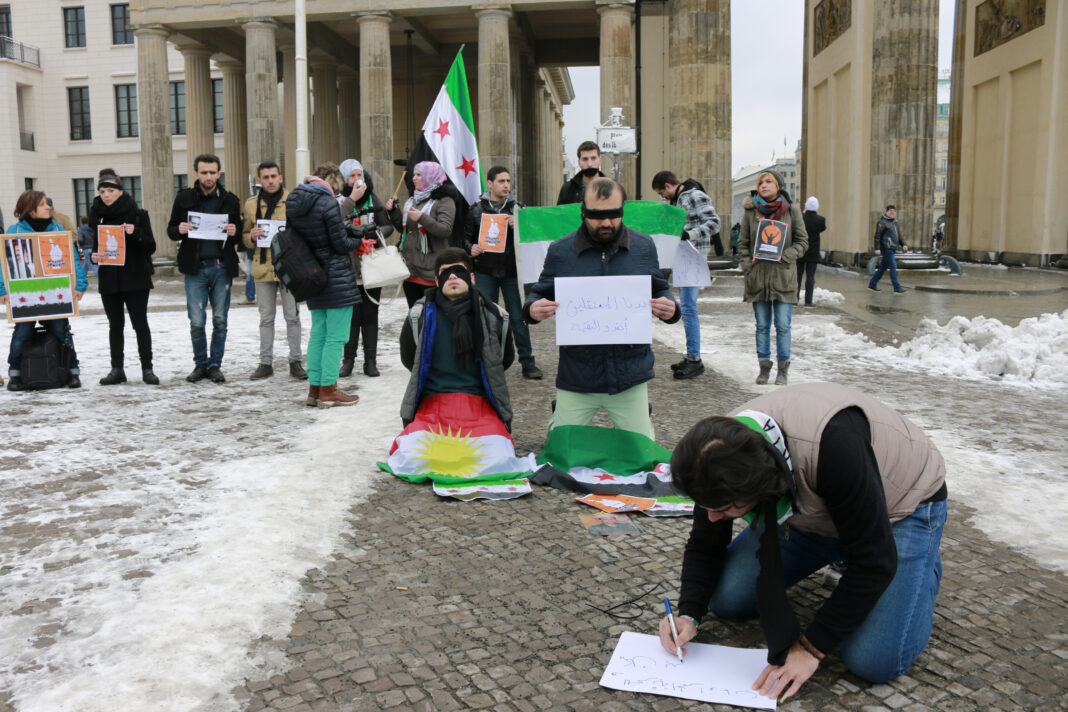By Ambra Visentin
Patrick Kroker is a lawyer at the European Centre for Constitutional and Human Rights (ECCHR), where he leads work on human rights violations in Syria. He was counsel of the co-plaintiffs in the Al-Khatib trial against Anwar R. and Eyad A., two former officials of Syrian President Bashar al-Assad’s intelligence service. The trial in Koblenz ended in 2022 with two long prison sentences.
In this interview, Kroker talks about the latest developments in the legal fight against war crimes and crimes against humanity.

Mr Kroker, what is the focus of your work at the moment?
“Because it is a very long-term commitment that we have made, everything that we have started is still going on, which is mainly the work with survivors of torture that we advise and also support in other aspects. And that doesn’t end with the criminal complaint. There are other investigations that we are supporting. Very concretely, the case of Alaa M. in Frankfurt (a doctor accused of being involved in the Syrian torture system, ed.). We are also currently investigating the human rights situation and international crimes in northern Syria. We are focusing on the Turkish-occupied Afrin region, and the Idlib region, where Islamists are carrying out killings, torture and abductions.
There is also likely to be a trial against Khalid Halabi (Halabi headed the Syrian General Intelligence Directorate in Raqqa from 2009 to 2013. When rebel forces captured Raqqa in 2013, Halabi fled to France, where he initially applied for asylum, ed.).
We have always done public communication or advocacy work to use the results of accountability efforts also for the political process, and whether it is to prevent the normalisation of relations with the Syrian regime, or also to inform the discussions on broader transitional justice in Syria.”
Which areas in Syria are currently most affected by violations, and who are the perpetrators?
“I think that crimes have been committed regularly on all sides for a long time. The fact that the regime is primarily responsible has not changed, because there are still thousands and thousands of people who have disappeared, who are imprisoned, who are killed, who are tortured every day.
We have to remind ourselves of what is important and we have also looked at the gap, so to speak, in the accountability work. I think there has been a lot of progress, small steps, but still symbolically important when it comes to the criminality of the regime.
We have the two Kublenz judgments, which characterise these acts against humanity by torture, by sexual violence, by killing, and more efforts have been made in that direction. The International Court of Justice trial of Ali Mamlouk, Jamil Hassan and Abdel Salam Mahmoud is also about to begin in France.”
After the Koblenz trial, which other cases have been of particular importance to you?
“One that I have been very closely involved with, which unfortunately has flown under the radar, is the case against a Palestinian militia member, Moafak D., who was a leading figure in a pro-Assad militia in Yarmouk, a refugee camp and district of Damascus. He was charged with war crimes for throwing a grenade into a crowd gathered to collect UN aid packages in March 2014. At the time, the city was under siege by the Assad regime, which considered its population to be rebellious.
The trial in Berlin was quite short. I think we had about 13 evidence points and very compelling evidence and therefore the person could be convicted quite quickly with the maximum sentence which is life imprisonment. He has appealed, it is not a final decision. I represented the survivor. I think it was particularly sad that this went largely unrecognised internationally, because a very emblematic crime of the Syrian regime was at the centre of this, although unfortunately not legally, and that was the siege of Yarmouk. There was this anti-tank rocket that was fired at a group of people. They knew they were in danger of dying, but they went out because of these packages that were being delivered because of the siege.
I thought it would be relatively easy to make that part of the trial, to have it described as a crime against humanity, which unfortunately it wasn’t, but I’m still hopeful that maybe Yarmouk is not the end.”
So the charges were not extended to crimes against humanity?
“He was charged with a war crime, the killing of 10 people and the attempt to kill 2 people, one of whom was my client. If it had been prosecuted as a crime against humanity, then you would have had to show that all of this was part of a widespread and systematic attack against the civilian population, which I strongly believe it was.
People were dying of starvation and people were eating their pets to survive and somehow we had it in the judgement because I appealed to the court in my closing arguments to have these facts in the judgement even though they are not strictly necessary legally but the real siege as a crime against humanity has yet to be litigated.”
How many victims of these crimes have there been in Syria?
“I think that even the figures that the Syrian Network for Human Rights has are really just estimates. The torture prison that was the focus of the trial in Koblenz was just one of thousands of others across the country. The period taken into account was between April 2011 and September 2012, and the prosecutor’s estimate was that at least 4,000 people were tortured in that one prison in those 15 months.
And another example we can use is the Caesar files, the almost 50,000 images that have been smuggled out of Syria showing dead, mutilated bodies, all showing signs of severe torture and malnutrition and so on. There are almost 6,000 people in these pictures, also taken roughly from May 2011 to August 2013. And then the Syrian regime’s repression intensified, so this gives us an idea of the number of victims we are talking about.”
Let’s talk for a moment about the principle of universal jurisdiction. When do crimes have an international character and become prosecutable?
“Crimes against humanity are a much higher threshold than human rights violations. There are many human rights violations that we cannot prosecute under universal jurisdiction, we need an international crime that is codified in the statute of the International Criminal Court, these are crimes that have a macro-criminality, a mass-criminality aspect”.
When can international criminal law intervene?
“International criminal law is based on moral norms. The prohibition to commit crimes against humanity, war crimes and genocide is universal. And if you do that, you run the risk of being prosecuted and that is an international legal principle and it should be applied worldwide and it should be applied equally against Western and powerful governments and corporations, and not only against the powerful Russian government. There has been very systematic torture by the US and its allies.
The main doctrine of international law is that it can only be done if the state of origin of the perpetrators or the state on the side of the perpetrators does not do it. Only then can third countries intervene, and I also believe that the place where the crimes are committed or where the perpetrators come from is most often the best place to do it.”
What are the crimes that the Western world should be prosecuted for?
“Definitely the whole programme of torture and rendition after 9/11, which of course was orchestrated by the United States, but which was facilitated by so many countries, certainly including my government, as well as the UK, the Polish government, they were all involved, at least in the renditions, knowing and allowing flights to go through where people were taken to detention centres.
The Iraq war in 2003, and this is now coming back to haunt us in the West, with the war in Ukraine, it’s a paradigmatic war of aggression. And that’s one of the many reasons why in so many parts of the world, especially in the so-called global south, there is a reluctance to follow the moral outcry of the West against the war and the aggression against Ukraine.
These are just very blatant cases, but if you think of Italy, for example, there is involvement in targeted killings by drones that take off from Sicily and kill people illegally.
Wherever the West is involved, there are war crimes. But we never, or hardly ever, see any consequences, and that’s probably the main reason why countries follow the very cynical approach of states like China and Russia, because we are actually applying double standards in international criminal law.”
Cover image: protesters from Syria showing methods of torture and persecution. Brandenburg Gate. Image by 360b on Shutterstock.
To learn more, read our Syria conflict factsheet
Other related articles:

























